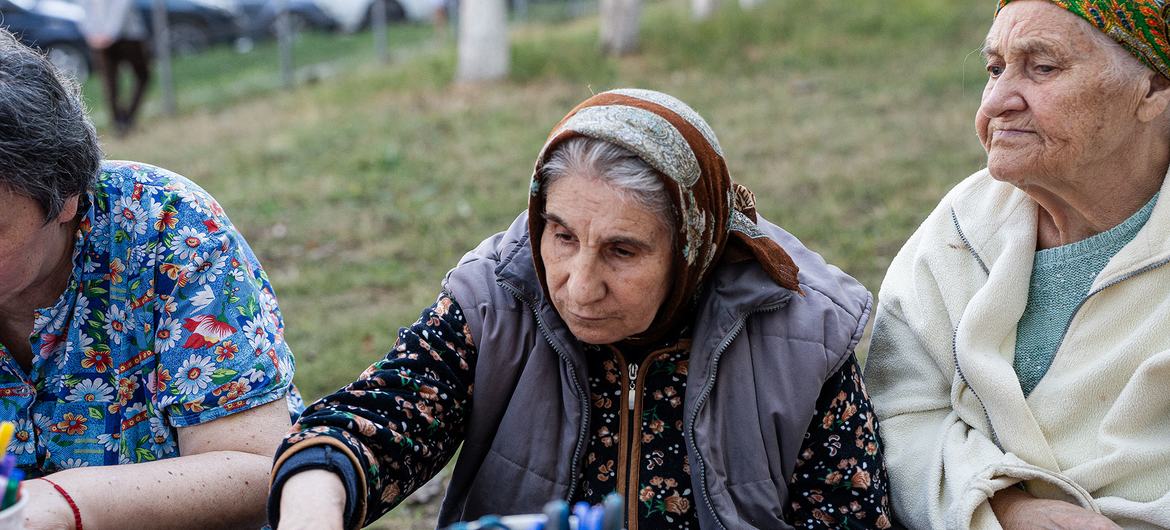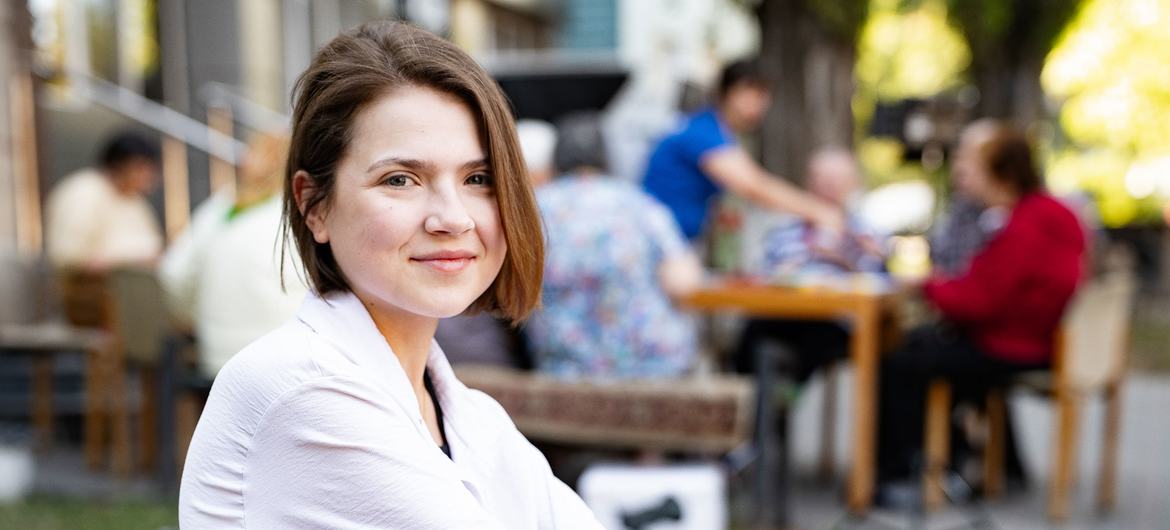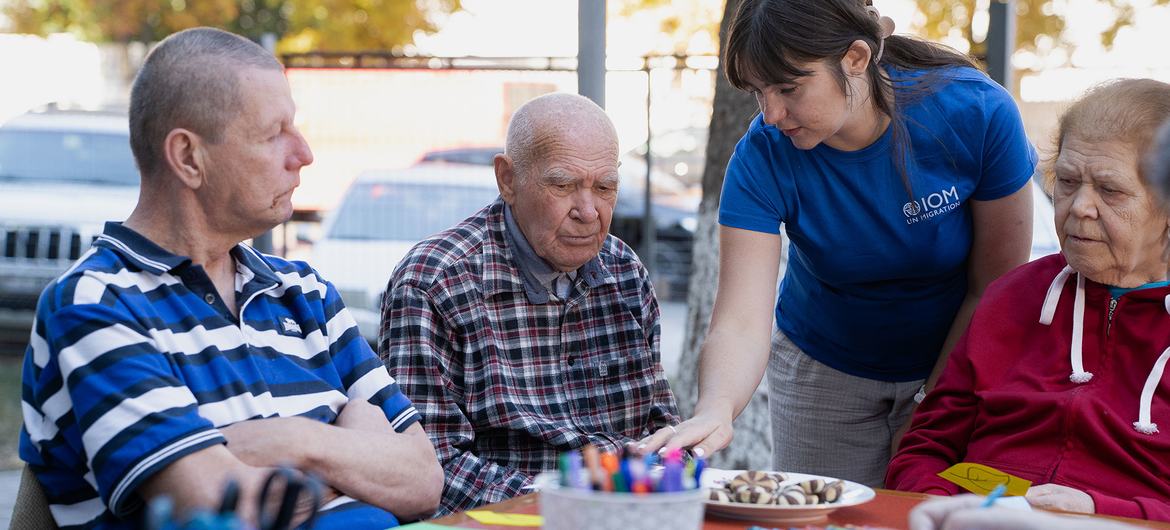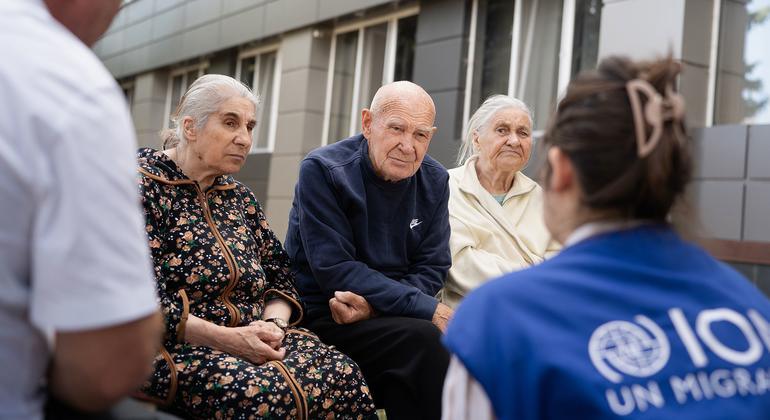“I saw people running away, so I joined them,” the 88 -year -old Yuri remembers, thinking back on the day he left Ukraine. “I came to Moldova alone, without family and no children to approach.”
Most days, Yuri spends time in the yard in a mental health center in Chișinu, where he participates in therapeutic activities that help him manage his feelings and his loneliness.
“I’m doing well here, but everything is new to me in Moldova,” he says. “Sometimes it’s fun at the center. I’m also talking to people who stay here, but I don’t really have friends. Maybe it’s because I’m already old.”
Attacks on Ukraine continue to escalate and destroy civil infrastructure.
Not far from Yuri, 73-year-old Ana often sits with her friend Alla, 79. Originally from Moldova, Ana had lived in Odesa before the war and worked as a university cleaner.
“I liked to clean,” she says. “As a kid, I always helped my mother when she needed support for my younger brother.”
When the war began, Ana’s family urged her to return to Chișinu. Although she was reunited with her relatives, she struggled with sadness, anxiety and depression and eventually agreed to advise.
Ana was recorded in July 2023 with severe anxiety, insomnia and restlessness, and gradually became better through counseling, art therapy, hiking and group activities.
“I found my home here,” she says. “Now I’m not afraid anymore.”

Ana (center) sits with other older women who have sought support in the center of Chișinu.
Also in the center is Marharyta, 25, known as Margo. Originally from Ukraine, she arrived in Moldova a year ago and has been fighting for eating disorders since she was 15 years old.
As her condition worsened a few months ago, she realized that she could no longer cope alone and sought help.
In Ukraine, Margo earned a degree in applied mathematics, later taught children and worked as an analyst. The war forced her to leave her family and her job, which left her feeling uncertain about her future.
“I’ve never wanted to ask my family for help because I thought I was strong enough,” she says. “I was wrong. When I came here, I realized that there are people ready to support me. Never be afraid to ask for help.”

The center in Chișinu offers Margo a safe place to share his experiences and find support.
Since the war began in February 2022, Moldova has been influenced by thousands of Ukrainians crossing the border in search of security.
Speaking prior to World Mental Health Day marked annually on October 10 Arkady Astrakhan, director of Chișinay Mental Health Community Center, said “Authorities mobilized across different sectors to coordinate the country’s response. It included setup of mental healthcare.”
Since 2023, the International Organization for Migration (IOM) has supported the center by expanding specialized Mental Health and Psychosocial Support (MHPSS) services for Ukrainians, including mobile teams, counseling, social activities, art therapy, vulnerable groups and an addiction recovery program.
IOM provides almost 90% of the center’s services and ensures care of those with complex needs, supported by staff training in burnout prevention and psychosocial support.

Older people upset by the war in Ukraine Access Counselling in Chișinu, Moldova.
“Although new measures were introduced to provide medical treatment to people who are displaced from Ukraine, those who live with chronic or serious mental health conditions still stood serious gaps in services.
IOM has played an important role in tackling these holes, ”says Astrakhan.” Supporting people with such complex needs can be challenging, but it is also deeply meaningful. “
An hour from Chișinu offers IOM’s renovated mental health center in Orhei tailor -made support for people with serious mental health conditions.
Since the war began, 1,080 Ukrainians in Moldova have received specialized mental health support from IOM, with peer-to-peer initiatives led by health mediators connecting them to timely care.
In Moldova’s social centers, resilience has many forms. For Yuri, it is in the small conversations that make him feel less alone. For others, it is in therapy sessions or the quiet insurance that support is nearby.
Together, their stories remind us that healing in the shadows of the shadows is possible.



